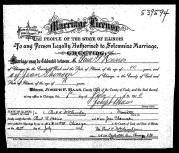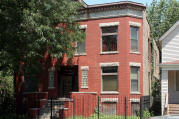

|
| SEARCH |
Marriage of Paul Harris |
| July 1910 |
 Although
we have the marriage license for Paul and Jean Harris, it perhaps raises
more questions than it answers. With the help of Julia Reed at the
Newberry Library, Chicago, of Susan Hanf at Rotary International History
and Archives, and Jack Selway, we have found out a little. The first
curiosity is that the license shows Paul Harris as aged 40. He was in
fact 42. This should and could have been corrected, but wasn't. The
minister who conducted the wedding was the Rev Paul McClanahan, the
young priest of the Second United Presbyterian Church. This church would
be most appropriate for Jean Thomson who had come to the USA from
Edinburgh, Scotland, where the Presbyterian church has always been
particularly strong. We have no evidence but it is likely that she
attended this church, which was on the corner of 65th and Parnell
Avenue. This was just a few blocks from 416 West 60th which according to
the license was where Paul and Jean were married. This building which
still exists, appears to be an ordinary dwelling, Exactly why this house
was used, we do not know nor whether either Paul or Jean had a
connection with it. Although
we have the marriage license for Paul and Jean Harris, it perhaps raises
more questions than it answers. With the help of Julia Reed at the
Newberry Library, Chicago, of Susan Hanf at Rotary International History
and Archives, and Jack Selway, we have found out a little. The first
curiosity is that the license shows Paul Harris as aged 40. He was in
fact 42. This should and could have been corrected, but wasn't. The
minister who conducted the wedding was the Rev Paul McClanahan, the
young priest of the Second United Presbyterian Church. This church would
be most appropriate for Jean Thomson who had come to the USA from
Edinburgh, Scotland, where the Presbyterian church has always been
particularly strong. We have no evidence but it is likely that she
attended this church, which was on the corner of 65th and Parnell
Avenue. This was just a few blocks from 416 West 60th which according to
the license was where Paul and Jean were married. This building which
still exists, appears to be an ordinary dwelling, Exactly why this house
was used, we do not know nor whether either Paul or Jean had a
connection with it.  Photo
by courtesy Neil Dahlmann, Highland Park RC Photo
by courtesy Neil Dahlmann, Highland Park RC416 WEST 60TH IN 2011 Over the years, many streets in Chicago have been re-named and renumbered. A major renumbering occurred in 1909 but this would have been before the marriage, so it seems that this building may well have been where the ceremony was carried out. It was apparently built in or about 1890. So far we have not traced who lived there in 1910. The Rev Paul H McClanahan was involved in politics, standing for office on the slate of the 'Prohibition Party', and being a member of a Prohibition Committee. We have no knowledge as to whether the Harrises were teetotallers or not as we have not found any photos showing either Paul or Jean with a glass of anything identifiably alcoholic in their hand. There are some clues in 'This Rotarian Age'. One quotation reads:- " Interspersed with wine rooms were hundreds of saloons, some of which were breeders of crime and political corruption, while others were not considered offenders in those particulars. Wets and Dries who knew ante- prohibition days in Chicago, are in agreement on one phase of the much mooted question: they are in agreement in the belief that saloons, as then conducted, were liabilities rather than assets. "(p. 24) " ...the stimulating influence of alcohol served as quick and certain means of breaking down the barriers between men.... A strong man might withstand its demoralizing influences for a time a long time perhaps, but it usually got him sooner or later." (p. 24) " Rotary has never taken sides on the prohibition question, but Rotary gatherings have been characterized in all countries for sobriety." (p. 64) These certainly hint at Paul Harris's views, but are not conclusive. If anyone can help with either the reason for the use of 416 West 60th rather than a church or whether the Harrises were teetotallers, do please contact us. www.historycomment.org 2011 August Update 2011 December Update Provided 21 August by RGHF senior historian Basil Lewis, England. |
RGHF members, who have been invited to this page, may register RGHF members, who have been invited to this page, may register If a DGE/N/D joins prior to their year, they will have more exposure to Rotary's Global History by their service year. This will be beneficial to all concerned. *Based on paid members, subscribers, Facebook friends, Twitter followers, mobile app users, History Library users, web pages, and articles about Rotary's Global History RGHF Home | Disclaimer | Privacy | Usage Agreement | RGHF on Facebook | Subscribe | Join RGHF | |